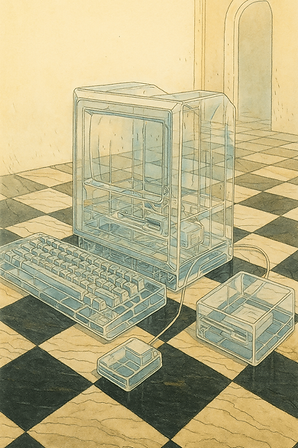top of page
| SUMMER ISSUE '25 | SUMMER ISSUE '25 | SUMMER ISSUE '25 | SUMMER ISSUE '25 |
Long before Schmalk, there was a magazine - the first of its kind. Actually, the first ever! Let's dive into the story of Le Mercure Galant. READ NOW >
I met the old man on a night train between Hamburg and Freiburg. His mis-sion: Topple the climate move-ment. READ NOW >
Based on an old Spanish poem with has only survived in the community of Moroccan Jews, we present to you the Rhyme of Count Arnald. READ NOW >
With the introduction of Apple's Liquid Glass in iOS 26 a lingering feeling finally makes sense.
READ NOW >
| EDITORIAL | SUMMER ISSUE '25 | EDITORIAL | SUMMER ISSUE '25 | EDITORIAL

Welcome to Schmalk
We asked our editor Giorgio Vasari to write where the idea of the Schmalk Print Society stems from and this magazine wishes to achieve.
It starts with Enlighten-ment. A time of our civili-zation in which the dissemi-nation of knowledge and the empowerment of the indivi-dual was celebrated. The tremendous optimism of the Enlightenment was carried forth and hearkened to in the centuries hence. Even in the most terrible moments of the 20th century, the belief in the triumph of humanity’s better nature rejuvenated our societies in their darkest hours, remin-ding us of who and what we could become.
But in our time the dream of Enlightenment seems all but forgotten. The first two decades of the 21st century indicate a fateful collective decision has been made. We choose to believe humanity is irredeemable.
Where once it was assumed that humanity’s march of progress was more or less a given, the new millennia revealed that humanity both progresses and regresses simultaneously. Our era is widely assumed, contra to philosopher Leibniz, to be among the “worst of all worlds.”
The truth of the matter is that the world has always been an ugly place, and the things that have happened now are the norm of the sad tale of human history. However, today these terrible contemporary events are broadcast and presented en masse via the internet, giving humanity unprecedented access to drink from the bitter cup of suffering that surrounds us. Thus, the unfortunate fact that the internet, the very thing intended to be the great agent of Enlighten-ment in the twenty-first century, has instead become humanity’s
great disenchanter and demoralizer. The “myth” of Enlightenment has been “busted.” It can no longer cohere with the tumultuous reality we undeniably know. Humanity in many quarters appears to have given up under this onslaught of information. The internet has exhausted itself and exhausted humanity with it.
What is to be done? We aim to redeem the tool of disempowerment. We wish to offer both a purgative and heartier fare than the measly and miserable contemporary diet. Herein we, the founders and authors, aim to provoke, question, and inspire. This is a magazine of the curious, the unusual, the bizarre, the grotesque—yet also a magazine of the pleasant, the delightful, the enno-bling, and the edifying. Much has been forgotten of what has edified and strengthened humanity before, through all of its woes, cares, and tribu-lations. We aim to examine and draw the full breadth of human experience to cele-brate our collective culture and knowledge, and an undying belief in a better future. We affirm that humanity is, indeed, redeemable.
The namesake of our magazine is the delightful and quaint town of Schmalkalden in Thuringia, lying in the centre of Germany. We derive our magazine’s heritage to a raucous carnival that was held as the town burned. Schmalkalden was in the midst of the greatest crisis it had ever known. Yet, in such a crisis the town held the most marvellous festivity, the memory of which has endured through the ages, an affirmation of life in all its variety amidst the destruction. For de-struction will always be around us: how we choose to respond is the question. So, we hope you, Reader, can join us in the festival, even amidst the flames of our world.
Welcome to Schmalk, a magazine of the Enlighten-ment for our day and age. And here let us raise a toast to Leibniz and this our Earth—yes, the best of all possible worlds.


| SUMMER ISSUE '25 | SUMMER ISSUE '25 | SUMMER ISSUE '25 | SUMMER ISSUE '25 |
bottom of page
.png)







_edited.png)









.png)